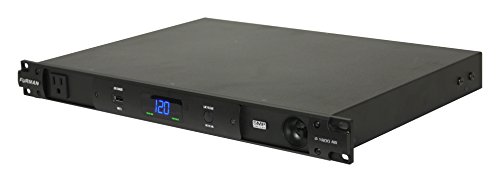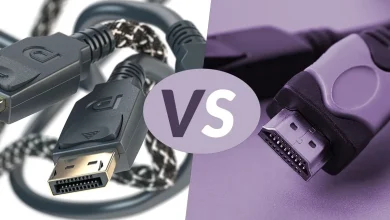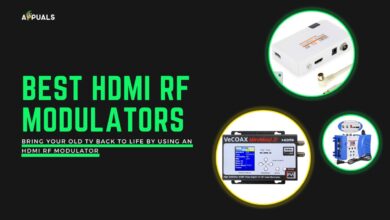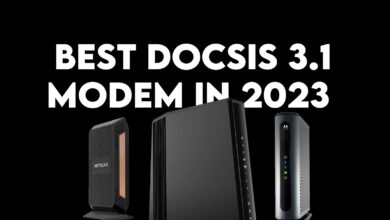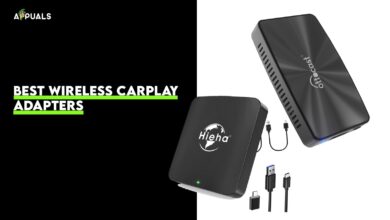Home Theater Power Manager Guide For Ultimate Reliability
Protect your expensive gear from spikes and surges by getting a home theater power manager
A home theater power manager is a necessary investment to protect the longevity of your expensive entertainment devices. As home theaters have become increasingly popular, having multiple devices such as TVs and amplifiers can leave them vulnerable to electrical fluctuations or spikes that can damage their internal hardware.
Investing in a good power manager is critical for prolonging the lifespan of your devices. A premium power manager will control all electrical fluctuations and spikes, ensuring a steady flow of electricity to your devices.
This article will go over the best home theater power managers. We have considered various aspects like price, performance, design, size, and portability.
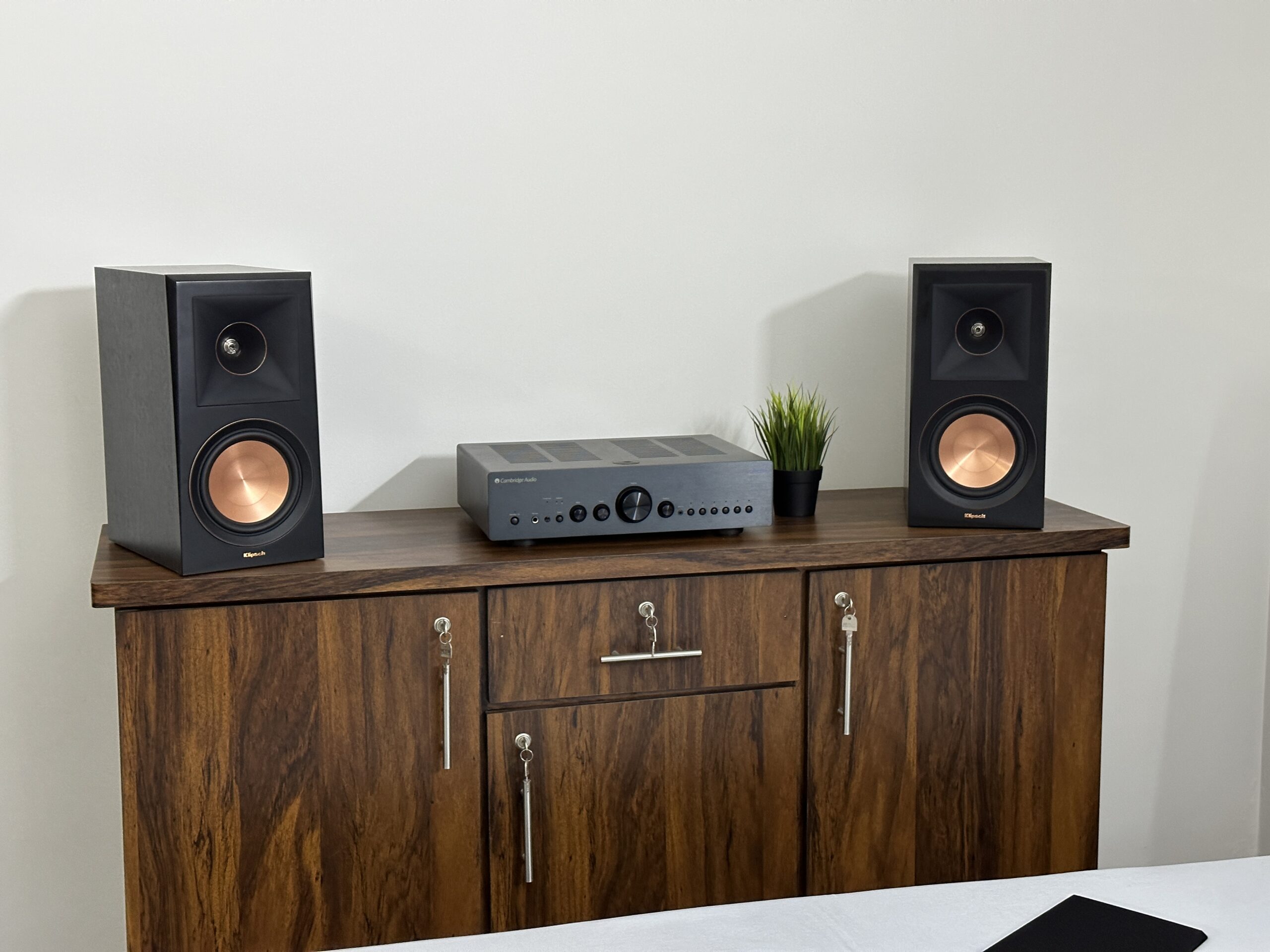
What Is a Home Theater Power Manager?
A home theater power manager is an essential device for anyone who has a home theater setup. It manages the power consumption of your home theater. Essentially, a home theater power manager acts as a surge protector, a power strip, and a timer all in one.
The key function of a home theater power manager is to protect your expensive home theater equipment from power surges.
Power surges are sudden fluctuations in your home’s voltage. Power surges can harm the internals of your devices and shorten their overall lifespan. So, it is essential to invest in the best home theater power manager as soon as possible.
In addition to providing surge protection, a home theater power manager also serves as a power hub, allowing you to plug in multiple devices at once. This can be very handy if you have multiple devices, like a TV, console, or streaming device. Secondly, it also reduces cable clutter and makes your setup look organized and neat.
Another key feature of a home theater power manager is the timer function. This function allows you to set a timer for your equipment so that it will turn off automatically after a certain amount of time. This can be useful if you tend to fall asleep while watching TV or if you want to ensure that your equipment isn’t using unnecessary power when you’re not using it.
Overall, a home theater power manager is a valuable investment for anyone who wants to protect their expensive home theater equipment.
| # | Preview | Name | Award | Details |
|---|---|---|---|---|
| 1 |  | Panamax MR4300 | Editor's Pick | Check Price |
| 2 | 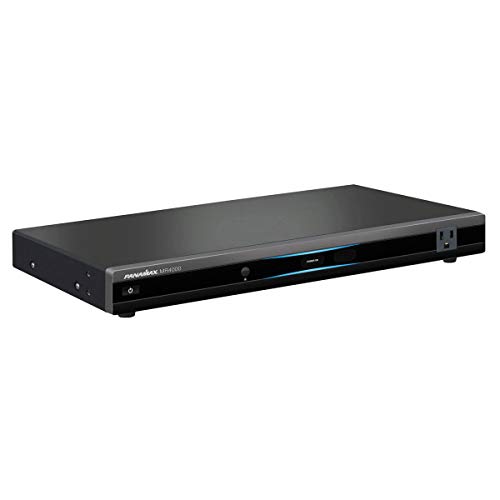 | Panamax MR4000 8-Outlet | Best Budget | Check Price |
| 3 | 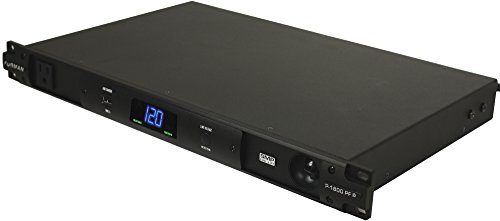 | Furman P-1800 AR Advanced Level | Best Premium | Check Price |
| 4 | 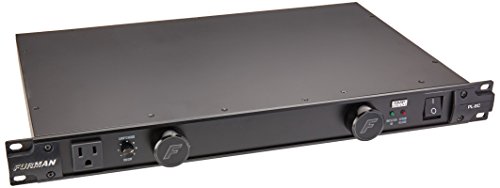 | Furman PL-8C 15 | Best Entry Level | Check Price |
| 5 | 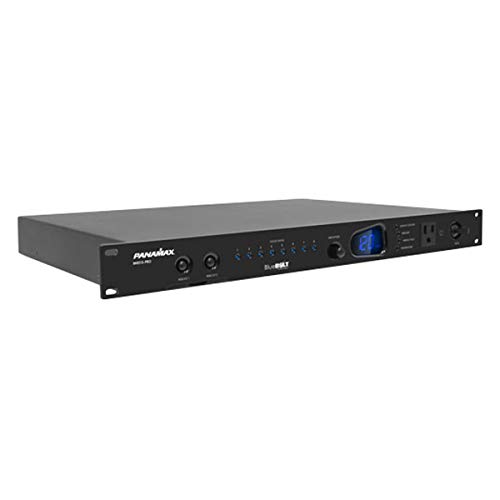 | Panamax M4315-PRO | Best Rack-Mounted Power Manager | Check Price |
| 6 | 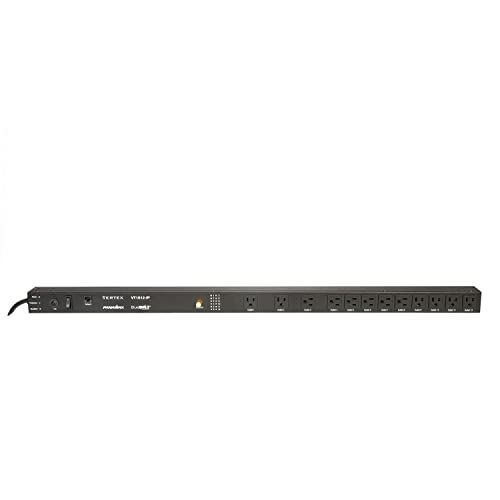 | Panamax VT1512-IP | Best Vertical Power Manager | Check Price |
| 7 | 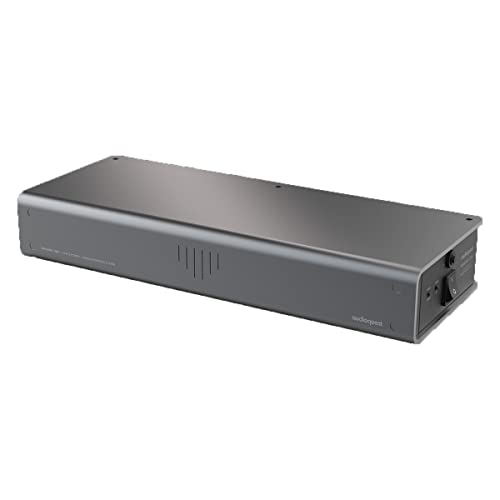 | AudioQuest Niagara 1200 | Best Acoustics | Check Price |
| # | 1 |
| Preview |  |
| Name | Panamax MR4300 |
| Award | Editor's Pick |
| Details | Check Price |
| # | 2 |
| Preview |  |
| Name | Panamax MR4000 8-Outlet |
| Award | Best Budget |
| Details | Check Price |
| # | 3 |
| Preview |  |
| Name | Furman P-1800 AR Advanced Level |
| Award | Best Premium |
| Details | Check Price |
| # | 4 |
| Preview |  |
| Name | Furman PL-8C 15 |
| Award | Best Entry Level |
| Details | Check Price |
| # | 5 |
| Preview |  |
| Name | Panamax M4315-PRO |
| Award | Best Rack-Mounted Power Manager |
| Details | Check Price |
| # | 6 |
| Preview |  |
| Name | Panamax VT1512-IP |
| Award | Best Vertical Power Manager |
| Details | Check Price |
| # | 7 |
| Preview |  |
| Name | AudioQuest Niagara 1200 |
| Award | Best Acoustics |
| Details | Check Price |
Last Update on 2024-09-19 at 04:36 / Affiliate links / Images from Amazon Product Advertising API
Why You Should Trust Us
Here at Appuals, we are very enthusiastic about hardware. As such, we hold everything we review to an incredibly high standard. Whether you are talking about the latest TVs, premium sound systems, or home theater power managers, we test everything from functionality to value to ensure that our readers always buy the best products for their needs.
One of our leading hardware writers, Asad Khan, has years of experience when it comes to home entertainment systems. Whether it is old CRT TVs or the latest and greatest 4K OLED monitors with the most expensive sound setups, he has seen it all. He loves to dig deep into the home theater genre and to find and test products that can enhance one’s experience when it comes to home entertainment. He is also well-versed in power hardware, from the latest power supplies to power managers; he knows about it all.
Under Asad’s lead, our highly experienced tech team sifted through dozens of options. We considered every factor, such as build quality, protection features, size, and overall value. To give an unbiased review, we go over all these aspects thoroughly and make sure we compare each product accordingly. Whether you are looking for a value-oriented option or the absolute king of the hill, we can help you find what you need.
Ultimately, we want our readers to have as much information as possible about the product they are looking for and make the correct choice for themselves.
Panamax is a reputable brand when it comes to making home theater power managers. They have built quite a reputation by producing high-quality products. Due to this, Panamax has become one of the go-to brands for surge protectors. That’s why our first product in this lineup is the Panamax MR4300.
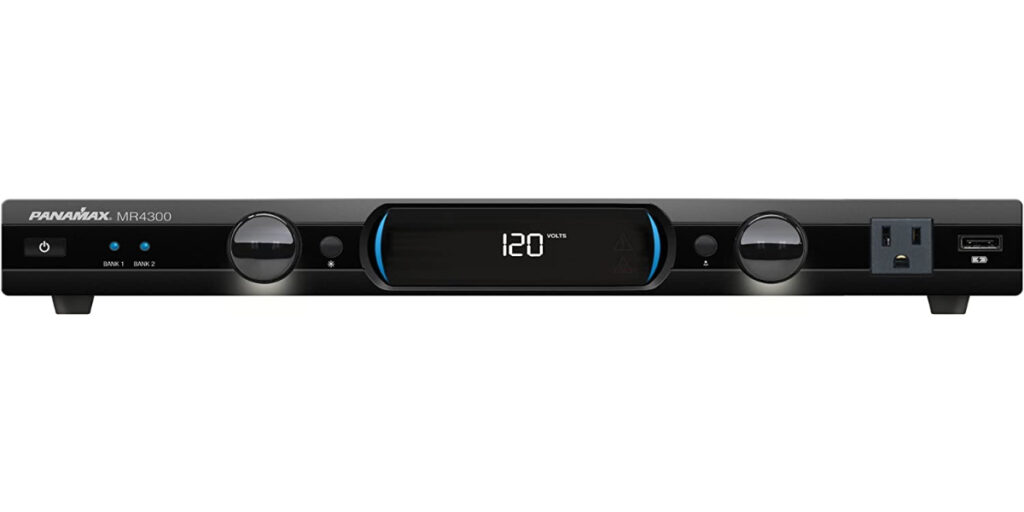
Just looking at this, the Panamax feels premium. The build is solid, with a sleek and minimal design. It features nine outlets on the back for all your devices. Furthermore, there is a digital screen on the front.
Apart from the aesthetics, the Panamax MR4300 is a great performing home theater power manager. It is efficient at protecting your devices from surges and spikes. One of the key features of this power manager is Automatic Voltage Monitoring (AVM). This ensures that all your devices get filtered and stable power. Furthermore, it is easy to set up initially. Unlike HDMI RF Modulators power managers are quite easy to use.
When it comes to protecting your devices, this power manager does not fall short, as it comes with Protect or Disconnect Technology, ensuring your devices remain safe.
Another Helpful Roundup: Best Wifi Cards
Apart from the impressive protection features, the Panamax MR4300 has great acoustics as well. This is because of its Level 3 noise filtration feature, which ensures a noise-free experience.
All in all, the Panamax MR4300 is a great pick. It offers good protection and features at a reasonable price. This is the reason it is our most recommended pick.
The next power manager on our list is for budget-conscious consumers. It is also from Panamax, which is the trusted brand for home theater power managers. The Panamax MR4000 is an affordable option from Panamax. It is a great choice for a power manager, as it comes with premium features without the hefty price tag.
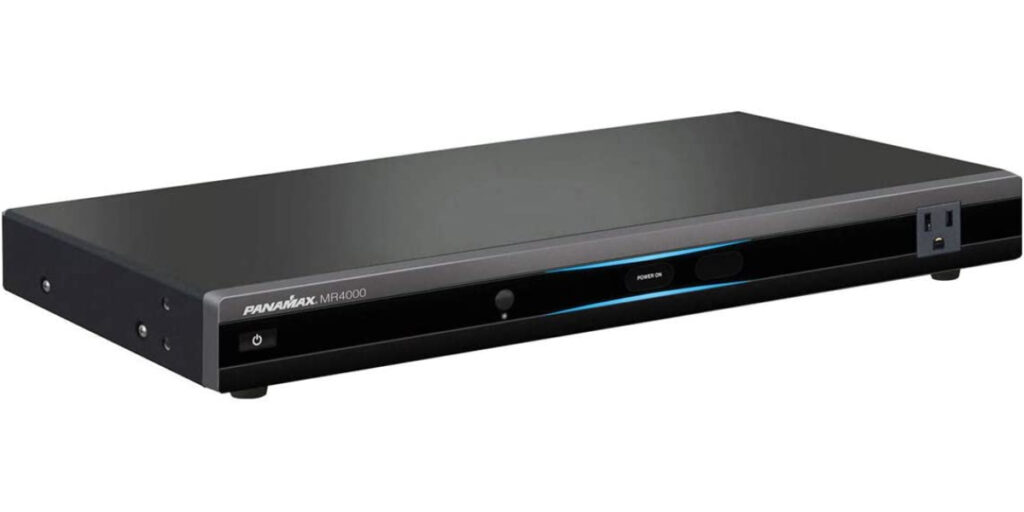
Starting with the looks, the Panamax MR4000 has a minimal and sleek design in a black color theme. It is objectively a better design than the Panamax MR4300 we discussed earlier. The Panamax MR4000 features eight protected and filtered outlets on the back, a digital monitoring screen on the front, and an inlet on the front as well. It sadly does not have nine outlets like the MR4300, but for the price, it is a fair sacrifice. Also, if you are on a budget consider checking out our best budget computer speakers.
Furthermore, Panamax did not fall short in the protection and performance departments. Even for a budget home theater power manager, the protection is great. It does not have AVM, Protect, or Disconnect like the MR4300, but it is still a viable option. It will still safeguard your devices from electricity spikes and fluctuations.
Another plus of the Panamax MR4000 is that it comes with a lifetime warranty for the devices connected.
Related Read : Best Bass Headphones
Overall, the Panamax MR4000 is perfect for those on a budget. This power manager packs a great punch even at a low price. It offers solid protection at a reasonable price.
Furman is also a reputable brand like Panamax when it comes to power managers. The company produces high-end surge protectors. That is the reason why our next pick is the Furman P 1800 AR Regulator. This is a premium option, so it does come with a hefty price tag. But the price is justified for the premium protection features.
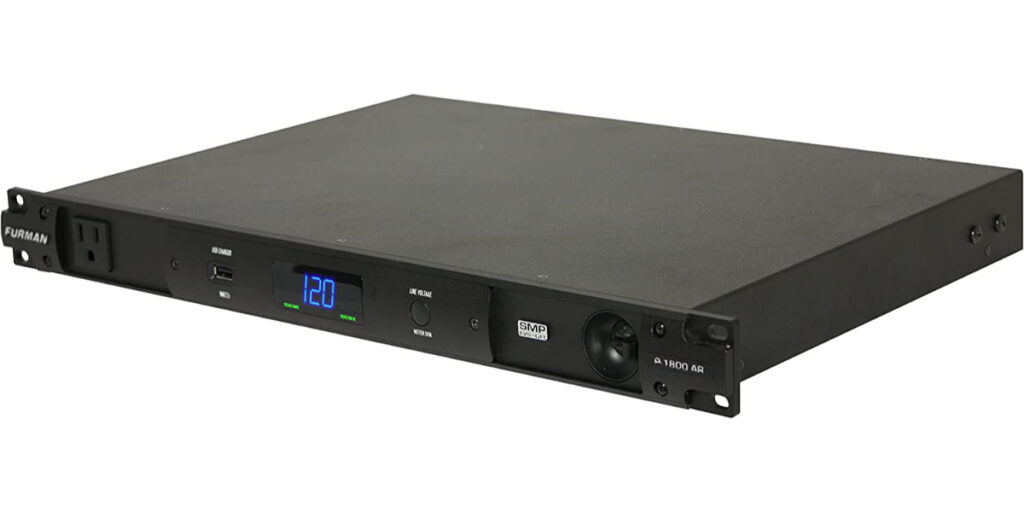
The Furman P 1800 AR does lack when it comes to looks. It comes with a very basic and old design. The size, on the other hand, is quite small, which is important if you have a tight space. The build is quite sturdy and feels premium in the hand.
Apart from its aesthetics, the Furman P 1800 comes with solid protection features. It has features like True RMS Voltage Regulation, which delivers stable 120 volts to your devices and protects them from voltage spikes. Plus, the Extreme Voltage Shutdown, or EVS, provides even more protection for your devices.
Checkout more peripherals: Best OSU Tablets
Furthermore, the built-in SMP technology helps keep your devices secure from electricity spikes and surges. This is great for increasing the lifespan and efficiency of your home theater.
Additionally, the Linear Filtration Technology (Lift) continuously filters AC power and gives you the best noise reduction experience in your home theater system. So, you can enjoy those movies and shows without the annoying noise.
Overall, this power manager is a viable option for those who have a high-end home theater with numerous expensive devices. The Furman P 1800’s solid protection features make it a great choice for high-end users.
If you have a basic home theater and do not want to spend a lot on a power manager, then our next pick is perfect for you. The Furman PL-8C 15 is a great pick for normal consumers. Because, it is quite affordable and has the premium protection features of the Furman P-1800 we discussed earlier.
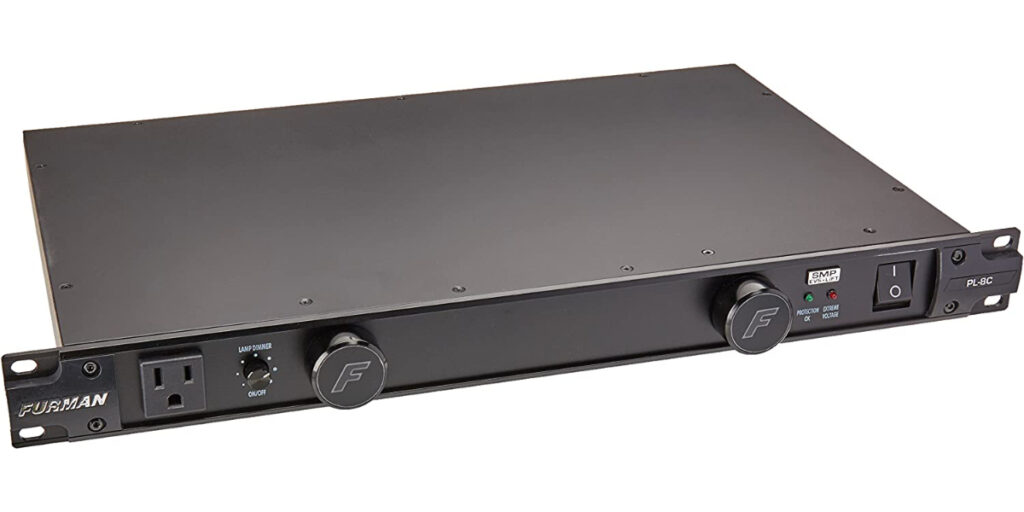
And even at a lower price point, it still comes with EVS, True RMS, and Lift. This means it has an impressive price-to-performance ratio and overall great value.
The Furman PL-8C 15 looks nothing special on the outside. It has a very basic design with a black theme. There are eight secure and filtered outlets on the back and one on the front. The build is quite sturdy and durable, which is great to see.
The Furman PL-8C does its job perfectly. It has features like True RMS, which keeps a consistent flow of 120 volts to your devices. It also has EVS or Extreme Voltage Shutdown which disconnects your devices if there is a huge spike or fluctuation in voltage.
Read More: Best USB 3.0 Hubs
Furthermore, it also comes with LIFT or Linear Filtration Technology. This makes it so that your power manager does not make a lot of noise, so you can enjoy your movies without having to worry about noise.
Overall, the Furman PL-8C is perfect for the average consumer. It has solid features at an unbeatable price point. This makes it our best entry-level pick.
As you’ve probably figured out at this point, Panamax is the go-to brand for high-end if you need a home theater power manager. The M4315-Pro is one of the expensive options on this list, and one of the few that are designed to be mounted in a rack system.
In terms of design, this home theater power manager is gigantic. While it’s not all that tall, it is quite longer than any of the others we’ve looked at so far. After taking it out of the box, you’ll also find rack-mounting accessories. We recommend mounting this one to your rack, as you’ll have a hard time finding an alternative place anyway.
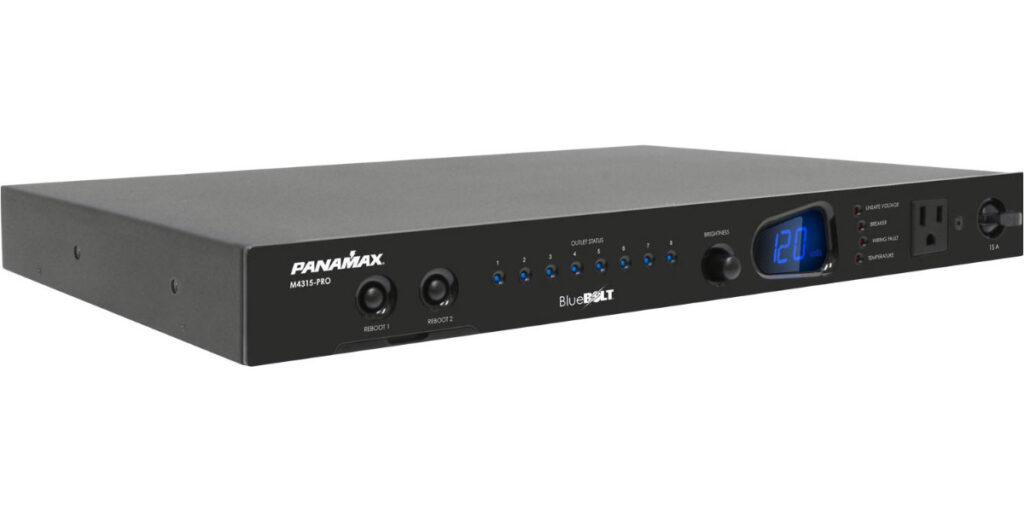
So, why is this one so expensive? Well, for one, it’s a high-end rack-mounted power delivery unit that features automatic voltage monitoring, 15 Amp outlets, and an auto shut-off feature. The latter means that this unit will automatically shut down once it goes above or below the pre-determined thresholds ((95-134V). Secondly, the linear filtration is second to none.
If you have a powerful amplifier that tends to “hum” because of unstable voltage, this power manager might be able to resolve that issue. The linear filtration cleans up the signal, and that will stop any devices from making any noise.
Finally, this one also works with the Panamax Bluebolt app, allowing you to control the device remotely. However, you will need to connect this to your home network via Ethernet if you want to do so. The app can be a bit of a pain to set up initially, but once everything is good to go, you won’t have any problems in the future.
In conclusion, this one is catered towards the enthusiasts who already have a server rack setup for A/V receivers, ethernet switches, and maybe even a NAS. Sure, it’s not for everyone, especially if you are in a tight budget and want something that is easier to set up.
Home theater power managers can be quite bulky and large, and that can be an issue if you are tight on space. If you fall into that category, then this one is for you. It is the Panamax VT1512-IP Vertical Power Conditioner. It is the best vertical power manager from Panamax.
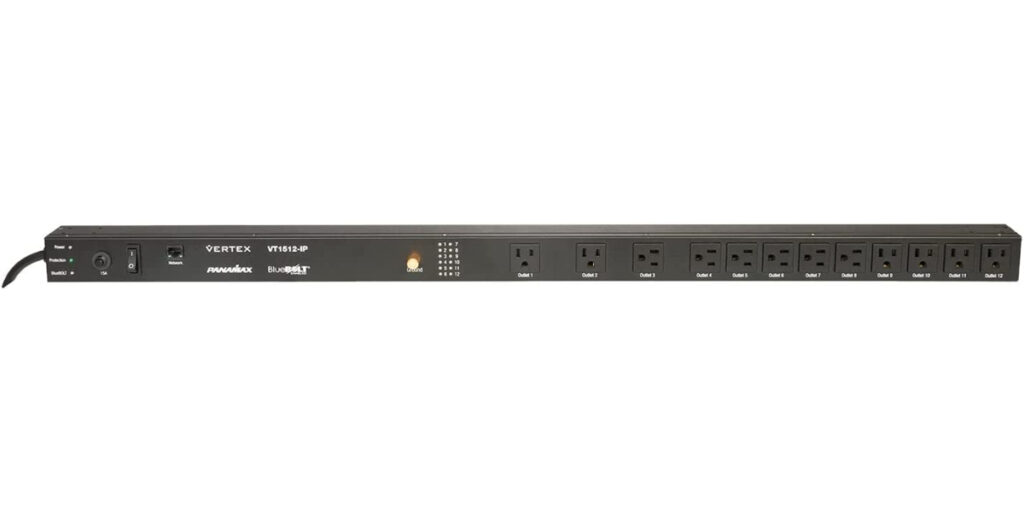
The Panamax VT1512-IP Vertical Power Conditioner comes with all the premium Panamax protection features but in a more slim and compact build. Looking at it, the power manager has a very simplistic design. It features an astounding twelve secure outlets, which are the highest we have seen so far.
This vertical power manager comes with Panamax’s Protect or Disconnect surge protection. This ensures that if the voltage spikes too high, the device’s power will be cut off to prevent damage.
Talking about compact form factors, check out our roundup of the best 8 inch tablets.
Furthermore, it features EMI/RFI filtering. This mitigates the high-frequency electromagnetic noise present on the power and signal lines. So, you can enjoy your movies without having to worry about noise or sounds from your power manager.
The Panamax VT1512-IP Vertical Power Conditioner also comes with a lifetime connected device warranty, which is a great plus.
All in all, Panamax did a great job with this power manager. It has all of the Panamax features in a slim build and packs quite a punch for its small size. It is the perfect choice for consumers who want to save space.
The last pick on our best home theater power managers list is the AudioQuest Niagara. AudioQuest, as the name implies, is centered around audio and video accessories like HDMI cables, audio cables, etc. The Niagara 1200 is from their Niagara lineup of power conditioners and is the successor to the Niagara 1000.
The Niagara 1200 has undoubtedly the cleanest design on this list. It has a matte silver finish and black ports. The silver and black color scheme gives it a clean look that will complement your setup. It also has a very compact form factor, which makes it easier to fit into your home theater.
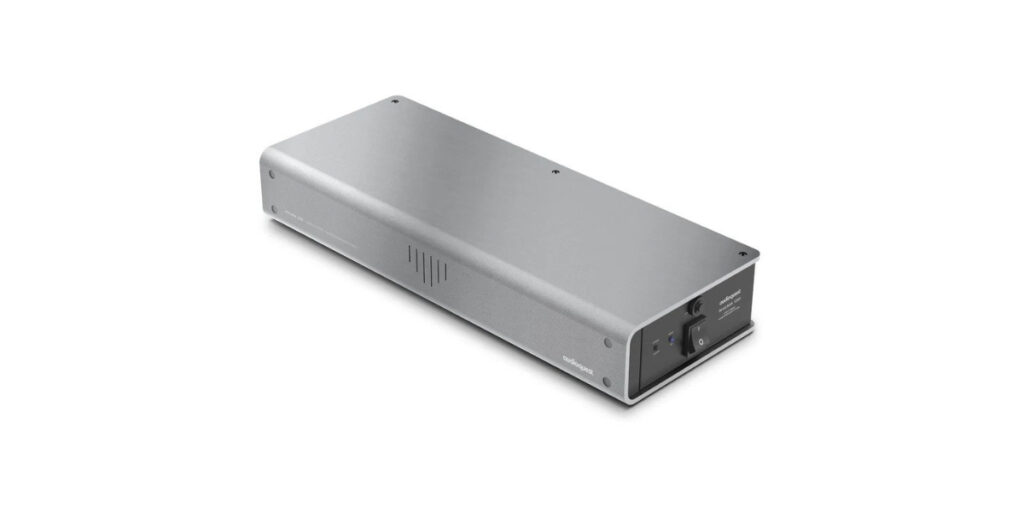
Furthermore, it has seven outlets on the back. The smaller number of ports is a tradeoff for the compact size. So, if you want a smaller power manager and seven ports are enough for you, the Niagara 1200 is perfect for you.
Apart from the impressive design, the Niagara 1200 does not disappoint in terms of performance. It works exceptionally well as a power conditioner. It can stand up to high voltage surges with ease and protect your devices from spikes.
The feature that sets the Niagara 1200 apart from others on this list is its noise-cancellation ability. AudioQuest calls it Level X Linear Noise-Dissipation Technology. This feature allows it to operate silently.
The Niagara 1200 is perfect for home theaters with premium sound systems. Because of this, it is a great pick for audiophiles. While on the topic of audio make sure to check out our best bluetooth receivers for your sound systems.
All in all, we would recommend the Niagara 1200 to those who are running expensive sound gear and want a compact build. The only bad thing about this is the price. The Niagara 1200 is quite expensive, but for the features, it offers it is not a bad investment.
Do I Need a Home Theater Power Manager?
We all have “dirty power” in our houses. There are often spikes and fluctuations in our voltage. These spikes and fluctuations can be dangerous for your home appliances as they can heavily damage the internals of your devices, which leads to short lifespans. That’s why you need the best home theater power manager for yourself.
If you are running a home theater or plan on buying one, Then, investing in a power manager is crucial. You don’t want your expensive setup to be damaged by these spikes.
That’s why buying a power manager is essential. Power managers protect your devices from all sorts of voltage spikes and fluctuations. They convert the dirty power into clean and safe power for your devices, which increases their life span. Furthermore, they also act as a power hub for all your devices, allowing you to connect multiple devices easily. This decreases overall cable clutter and makes your setup look organized and clean.
To sum it all up, if you have a home theater or any type of entertainment system, then a power manager is a very important investment as it can save your devices from dangerous and unexpected power surges.
Things You Should Know About a Home Theater Power Manager
Home theater power managers are a must-have for anyone looking to safeguard their home theater system against potential electrical disturbances. These devices include a number of features that protect your equipment from power surges, voltage drops, and electrical noise, among other things.
When shopping for a power manager for your home theater system, it’s important to consider factors like capacity, connectivity, placement, and maintenance, as well as the cost. By selecting the right power manager, you can ensure that your expensive audio and video components are protected and can enjoy a longer lifespan.
In this article, we’ll delve into some of the key things you should know about home theater power managers to help you choose the right one for your system.
Features
When choosing a power manager for your home theater system, look for one that has a variety of features designed to protect your equipment. Surge protection is essential because it can help prevent damage from power surges. Voltage regulation is also important because it can help maintain a constant voltage level even when power sags or brownouts occur. Another useful feature is noise filtering, which can help eliminate electrical noise that can interfere with your audio and video signals. Some power managers also have automatic shut-off features that can protect your equipment during a power outage.
Capacity
When choosing a power manager, make sure that it has enough capacity to handle the power demands of your home theater system. Look for a model with a high enough wattage rating to accommodate all of your components, including your TV, audio receiver, and any other devices you have connected. Keep in mind that some components, such as power amplifiers, may require more power than others, so factor this into your calculations.
Connectivity:
Also, check to see that the power manager you choose has enough outlets for all of your components. Some models also come with USB ports for charging your mobile devices. Make sure that the outlets are spaced far enough apart to accommodate bulky power adapters.
Placement
To ensure that your power manager provides maximum protection for your equipment, place it between your wall outlet and your home theater system. This will ensure that all power is filtered and regulated before it reaches your equipment. If you have multiple components that need to be protected, you may need to use a power strip or multiple power managers.
Installation
Follow the manufacturer’s instructions carefully when installing your power manager. Improper installation can compromise its effectiveness and even damage your equipment. Make sure that all connections are secure and that the power manager is grounded properly.
Maintenance
Regularly check your power manager for any signs of wear or damage. Look for frayed wires, cracked casings, or other signs of wear that could compromise its effectiveness. Replace your power manager if you notice any issues, as a damaged power manager may not provide adequate protection for your equipment.
Cost
Home theater power managers can range in price from relatively inexpensive to quite expensive. Consider the cost of your equipment and the level of protection you want when deciding which model to purchase. While a more expensive power manager may offer more features or better protection, it may not always be necessary depending on the quality of your home’s electrical system and the value of your equipment. Ultimately, choose the model that best meets your needs and budget.
How We Picked and Tested the Best Home Theatre Power Manager
Usually, when we’re putting together a “best of” article on Appuals, we put every product through a rigorous and tedious testing process. Selecting the best of the best home theater power managers among the myriad options available online was no easy task. This is especially considering the fact that most of them are professional-grade options, and feature information that is confusing to the average consumer.
As such, we decided to compile our list based on ease of use, the setup process, the number of outlets, and overall result in terms of protection capability. Everything else was just marketing fluff. Keeping these three things in mind, we were able to compile seven of the best home theater power managers out there.
Of course, some are more expensive than others. This doesn’t necessarily mean that expensive power conditioners aren’t worth it, it’s just that a good number of them might not be worth it for you. Most people reading this already have a niche use case, and further confusing them with utterly expensive options would not make much sense.
Despite that, we still included a few high-end options for the odd reader that is looking out for some professional gear. After we cherry-picked six of these modulators, we decided to test them based on different metrics.
The most important to us was their protection capability. Power managers are an essential component in your home theater. This is why we made sure to test that they can protect your devices from spikes and fluctuations. Furthermore, we also made sure to test surge protection. A power manager must be able to handle all sorts of surges and safeguard your devices against the worst.
Finally, we rank each power manager based on our testing and selection criteria, providing an unbiased view of each product’s strengths and weaknesses. We also provide a list of pros and cons to help you make an informed decision based on your specific needs and budget.
In conclusion, we take great care in selecting and testing the best home theater power managers available. Our selection process ensures that we provide accurate and trustworthy information, enabling you to make an informed decision and protect your home theater system from electrical disturbances.
Buyer’s Guide for Home Theatre Power Managers
A home theater power manager is an essential device for anyone who wants to protect their home theater equipment and manage their power consumption. And with the countless options available, it can be a hassle to find what you are looking for.
To make your life a little easier and help you find what you are looking for, our team tested dozens of power conditioners and sifted through tons of options to ensure you get the right product.
And after investigating, we have compiled a guide for the buying the best home theater power manager.
Surge Protection
When it comes to power managers, they must have good protection against surges.
So, look for a power management system that includes surge protection. This will protect your expensive home theater equipment from power surges caused by lightning strikes, power outages, and other electrical problems.
Number of Outlets
Everyone has different-sized setups with various devices. It is essential to buy a power manager to house all your devices. And it’s even better to get something with an extra port. Having extra ports will benefit you in the future if you want to connect some extra devices.
So, consider the number of devices in your home theater setup when shopping for a power manager. Then look for a power manager that has a sufficient number of outlets. This will help organize your setup and reduce clutter.
Power Rating
Another factor to consider when shopping for a power manager is the power rating. This is the total power draw of all your components. You can do this by checking the specs of the power manager you are interested in. Make sure to calculate the total power draw of all your devices, then buy a power manager accordingly. It is also a good idea to give yourself some breathing room and purchase something that is rated slightly higher than your requirements.
Price
Price is a key factor when it comes to power managers. There are both expensive and cheap options available. The more expensive options come with more features and are slightly better. A good budget power manager, on the other hand, will get the job done. So, consider your requirements and your budget while making the decision.
Another thing to consider is that if you have an expensive setup, going with a premium power manager is a good idea because it is safer and lasts longer.
Brand and Warranty
The power manager is a very important device in your home theater setup. If it fails to do its job, then your entire setup is at risk. The way to avoid this is to buy your power manager from a reputable and trusted brand like Panamax or Furman. The cheaper options do look convincing, but when it comes to power managers, going for the more premium option is often safer.
Secondly, check the warranty offered by the brand. For example, Panamax offers connected device warranties in case their power manager damages your device. It is ideal to take both of these points into consideration and make a well-thought decision.
In summary, when choosing a home theater power manager, look for a device that offers surge protection, has enough outlets for your components, has a sufficient power rating, includes a timer function, fits your budget, comes from a reputable brand with a warranty, and has positive user reviews. By considering these factors, you can find the best home theater power manager to protect your equipment and improve your overall home theater experience.
Home Theatre Power Manager - FAQs
A high-end home theater system will use around 500W of power when in use. However, considering if everything is on the higher end of the spectrum and requires that amount of power. Most of the time, your entire system will only consume about 350-400W of power.
A power manager for a home theater regulates the voltage from the wall to all your devices. It ensures that all devices receive clean and stable power to avoid any electronic damage. It serves as a power strip, voltage regulator, and device controller all in one.
f you have a decent home theatre system set up in your house, a home theater power is worth it as it will protect all of your devices from electronic damage.
An Audio/Video Receiver (A/V Receiver) is the heart of every home theatre system. It receives audio and video signals from multiple sources so that you can output them to devices such as your TV, speakers, or amplifiers.
 Reviewed by
Reviewed by  Check Price
Check Price